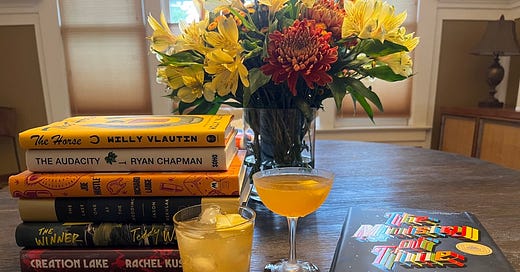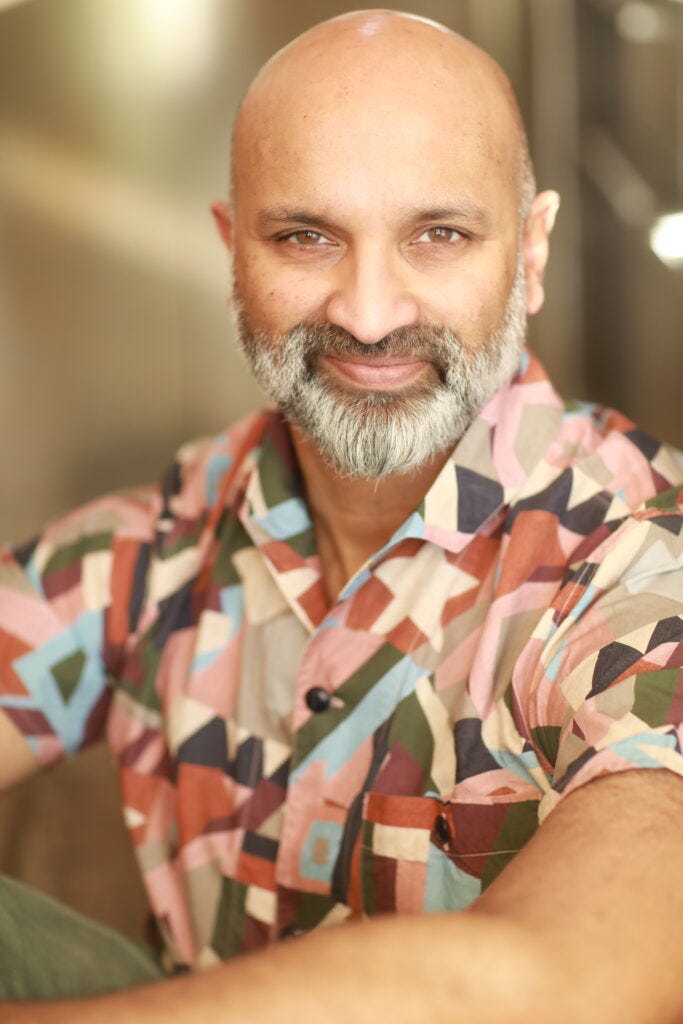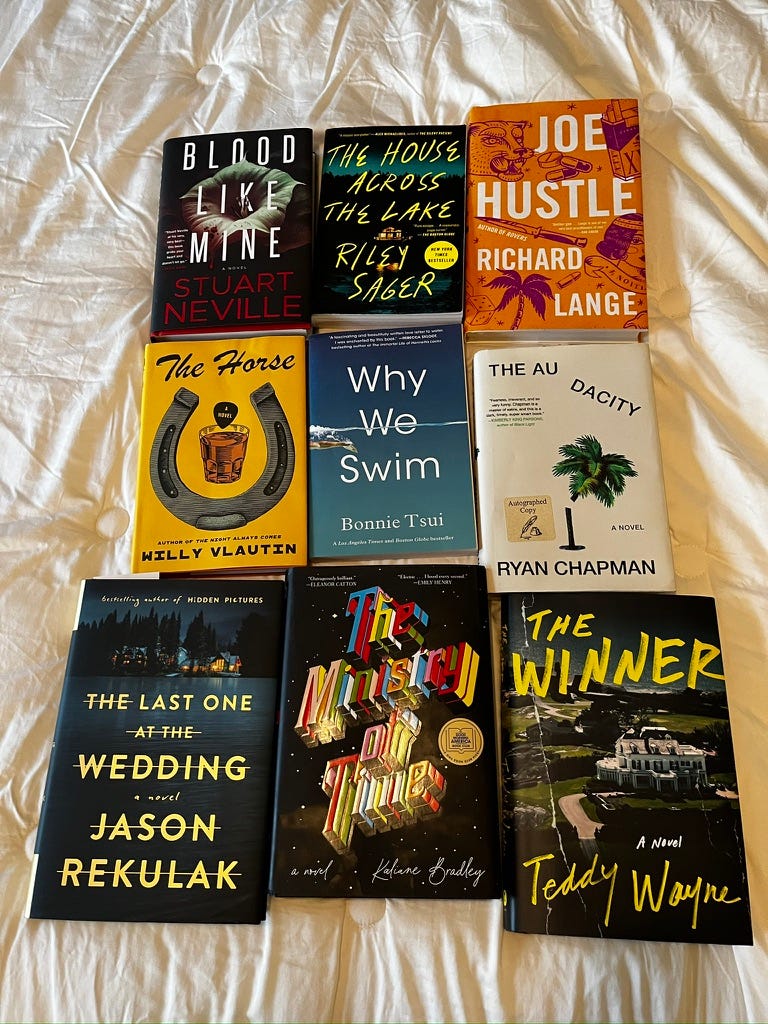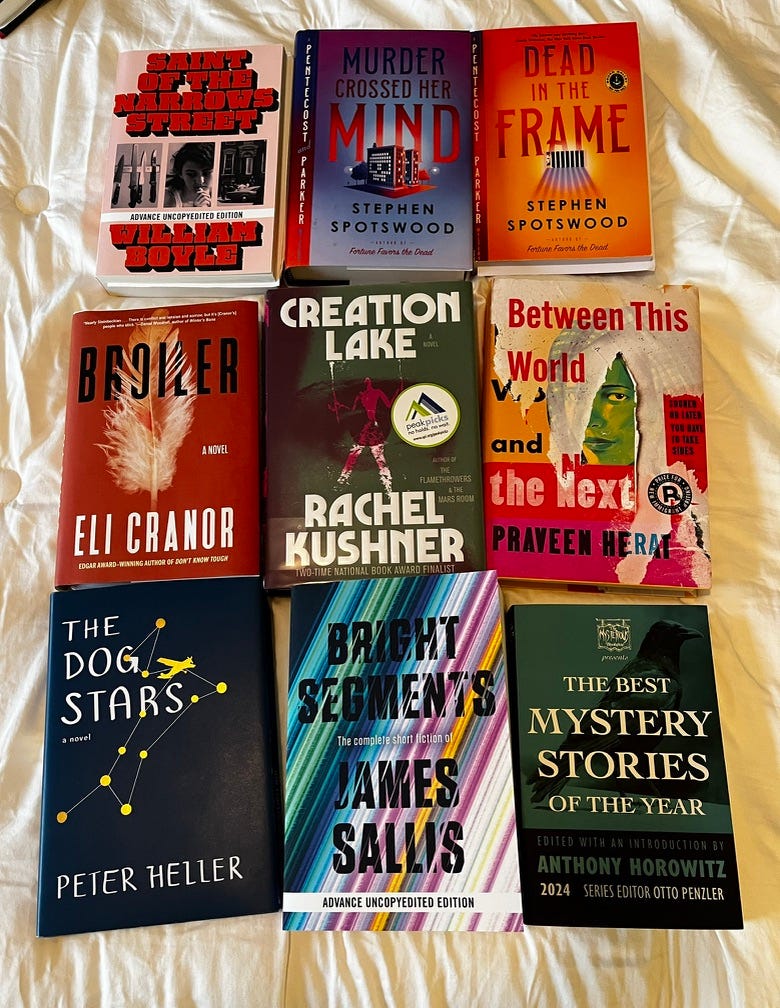Hey friends and readers,
Allow me to interrupt your election countdown doom-scrolling to say hello and share a few distractions, including a pile of books I’ve been reading since taking a little self-imposed hiatus from this newsletter.
Put down the phone and pick up one of these:
Horse, by Willy Vlautin
A small tale of a sad man trying to live a bigger, better life. Vlautin is a spare and soulful writer who shines an empathetic light on lives we mostly prefer to overlook. He makes this story of a broke, lonely, alcoholic sixty-something ex-rocker and a blind, mangy stray horse feel like the story of everything. Funny, moving, and deeply real. This one will stay with me. So will lines like, “Nothing good happens in a bar at night to a guy over fifty. It’s just a fact.” (Also, the lists of dozens of song titles that Vlautin ascribes to his character — “The Kid They Found by the Tracks” and “Cowboy Jim and the Narcoleptic” and “The Cops at the El Cortez” and “A Drink Before Work” — are like a small poetry collection.)
The Ministry of Time, by Kaliane Bradley
What a strange, ambitious, smart and surprising mix of sci-fi, mystery, history, and speculative near-future weirdness... Worth every block of yellow defacement by my highlighter, including little gems like (from a hunky time traveler referring to a coconut): "I’d never experienced a fruit that fought back so hard against being eaten.” Also a woman snoring lightly “like a puppy being squeezed.” Plus a “dank toothache of a day” and a day that “cracked open around me — I waded through its rancidly vivid yolk.” But all the while exploring colonialism, race, love, sex, and, especially, time.
Joe Hustle, by Richard Lange1
Like Vlautin, Lange lingers over those who're struggling to get by, often backsliding, but fighting to be strong and kind. I enjoyed spending time with Joe — ex-vet, ex-con bard of a barstool — and was rooting for him on every page. Funny, observant, respectful, sharp, and wise, Lange is the real deal and knows how to whip wonders out of weird small moments, like Joe running down an LA sidewalk covered with snails, leaving them crushed to snot in his wake. It’s a road-trip story, a crime thriller, and a love story with a message of hope and survival.
Creation Lake, by Rachel Kushner
Longlisted for the National Book Award and shortlisted for the Booker Prize, Kushner’s latest is a European eco-caper spy story on its surface, but is really a genre-bending profile of a wounded, driven, devious and alluring woman seeking to bring down a group of anarchists and at the save time save — or perhaps rediscover, or maybe even forget — herself. Woven throughout is the charismatic (and cultish) lead activist’s musings on the nature of ancient man, specifically his beautiful, underrated and beloved Neanderthals.
The Audacity, by Ryan Chapman
This breezy satire feels like a book of the moment. A bunch millionaires gather on a Caribbean island to choose one global problem to collectively solve. Meanwhile, one of the invitees is missing, mainly because the news just broke that her medical startup is a fraud. Her husband attends in her place, and through him we observe the richest of the rich in their natural and nasty habitat. Stealing from the blurbs (because it’s apt): it’s a little White Lotus meets Succession meets Gatsby meets Martin Amis, but wholly original.
Bonus re-read: The Dog Stars, by Peter Heller
I first read it when it first came out over a decade ago (my fellow editors and I picked it as one of Amazon's best of 2012). I rarely reread books and wish I did it more often. It was a treat to re-enter the fraught world of Hig, his dog Jasper, and their unlikely survivalist partner and protector, Bangley. Also to linger over Heller's post-apocalyptic poetry. Something like: Hemingway meets Jim Harrison meets Barry Lopez meets Norman Maclean.
Up next: Jason Rekulak and William Boyle (see photo below), whose previous books I reviewed HERE and HERE. Also the forthcoming Stephen Spotswood. I missed his last one, but mini-reviewed the previous one HERE.
And as we head into book award season, I’ll share this, from Kathleen Schmidt’s excellent
newsletter — “the best way to expand your reading pallet is to read long-listed books for literary awards.” Amen.Finally, a shoutout to one of my favorite Substackers, Michael Ruhlman. When he’s not sharing insider tips from his New York neighborhood (Below 14th Street) he and his novelist wife Ann Hood are traveling, eating/drinking, meeting cool people, and reading lots of books. I love the tone: not “look at us” but “aren’t we lucky” and “look at these great people and places.” I’m also grateful for Michael’s recent shoutout to Blood & Whiskey, which pushed this little publication above 3,000 subscribers. (And there was much rejoicing.)
Cocktail of the Month
I’d previously posted a guest cocktail from Michael (a Gimlet, from his last book, the The Book of Cocktail Ratios). Here’s another …
The Pegu Club*
2 ounces gin
3/4 ounce Cointreau
1/2 ounce lime juice
1 teaspoon simple syrup (optional)
Dash Angostura bitters
Dash orange bitters
1 lime wedge
Combine the gin, Cointreau, lime juice, and simple syrup in a shaker, add ice, shake till chilled. Strain into a chilled coupe or an old-fashioned glass over ice. Add the bitters. Garnish with the lime wedge.
[*Generous with the shoutouts, Michael hat tips writer Will Schwalbe for this drink, his fave. Schwalbe’s latest: We Should Not Be Friends]
Also, since fall is here (and, well, the election), you can never go wrong with…
Classic Old Fashioned
2 oz. bourbon
1/4 oz. simple syrup (you can also just use sugar)
2 dashes Angostura bitters
Pour ingredients into an ice-filled rocks glass and stir. Garnish with thin-shaved lemon or orange peel. (No need to do the muddling thing, imho.)
And for a twist: replace the bourbon with mezcal, the simple syrup with agave syrup or nectar, and the Angostura with something like Mole Bitters.
Btw, I started collecting all previous B&W cocktails in this section: Potions
Podcast of the Month
I wrote a 3-part series about the Titanic for American History Tellers.
Finally, I’m overdue in posting this Q&A with Praveen Herat, whose excellent book Between This World and the Next came out a few months back…
● Origins: Twenty years ago I was floored by an exhibition: John Pilger’s Reporting the World at the Barbican in London, which assembled the world’s greatest reportage photography. From that day on, photojournalism became an obsession and the photojournalist a central character in Between This World and the Next. In a time when we’re surrounded by images from all over the globe, often of horrible pain and suffering, what does that mean for us? What responsibilities does it place on us? If those questions fascinate and trouble you, I hope my novel is a good place to start. And for anyone in London this summer I recommend Storyteller, the Imperial War Museum’s exhibition of the work of Tim Hetherington, who was killed in Libya in 2011. It’s utterly remarkable—and free to all.
● Secret weapon: It can be a lonely business, writing. For years, you’re chipping away at something that only exists in your head, hoping your whittling will reveal a meaningful form. I think of it like Henry Moore’s concept of truth to materials, except as a novelist you’re working not with stone or bronze, but the world, human experience, ideas, what we feel. When you allow someone into the world you’ve made, who’s just as invested in the work as you are, that’s an extraordinary thing. I was blessed to have my agent, Anjali Singh, who helped me polish what I’d sculpted into something much better. With Between This World and the Next, this was a special challenge, as I had foolhardily planned it to be the first of a tetralogy; I had to retain the groundwork for books to come, without compromising on narrative momentum. Whether I ever write the sequels or not, of course, depends on Between This World and the Next’s success. (Insert praying hands emoji here, haha.) But regardless, I’ll always be writing something: it’s my vocation, my raison d’être, my love.
● Quote: The heroes of Between This World and the Next — Song, Fearless, and Amos — are all, in their own ways, living with loss and the desire to get away from the toll the world has taken on them. I think that’s best reflected in the lyrics of a song that Song sings (there’s a tongue-twister for you!), a classic of Cambodian rock, Ros Sereysothea’s “Kom Nirk Oun Eiy”:
This life and the next, my baby.
I’ll wish for you. Hopefully, I’ll get what I wished for:
That I’ll meet you in every life after this.
● Risk: I think the most daunting aspect of research is knowing when to stop: a challenge I’m not sure I’ll ever master. With a novel like Between This World and the Next, which tackles big themes (transnational crime, grief, our moral duty to others), there were so many directions to pursue and so many things to learn and turn over in my head. Ultimately, though, with everything I write, things boil down to a dozen or so indispensable sources. But you have to read a lot and explore numerous avenues before you can settle on exactly what those dozen or so are.
● Fuel: Writing’s sedentary; there’s no getting away from it. But that’s good, I think: moving around becomes so necessary it makes it impossible to avoid exercising. For thirty years, I have run several times a week. I could probably write a book about the intertwined nature of running and writing if only Haruki Murakami hadn’t already done it (and so much better than I can!).
● Escape: I worry more about getting into my own head or, more precisely, the flow state I need to be in to write well. Music’s essential for that—something I wrote about recently for largeheartedboy. Bark Psychosis’s wondrous Hex LP is one of my favorites; it’s never far from my record player or on infinite repeat on my phone.
● Hero: I’d travel back in time to share a tankard of ale with Chaucer. At the Tabard Inn—the setting for The Canterbury Tales. I’m pretty sure old Geoff would be a cool drinking buddy. And I like the idea of hamming it up with him in bastardised Middle English.
● Words: The majority, but not all, of my reading relates to what I’m writing. At the moment, I’m finishing up my second novel, which explores the quest for real human connection in an age when technology presents us with unprecedented opportunities but also grave challenges that threaten us, mentally, socially, and epistemologically. My protagonist’s life is dominated by an addiction to pornography and I’ve been reading a lot around modern masculinity and feminism, past and present. Yesterday, I read Grayson Perry’s The Descent of Man—a little gem. Amia Srinivasan’s The Right to Sex and Andrea Dworkin’s thrilling Intercourse have also been hugely important for me. People don’t talk enough about what a brilliant writer Dworkin was.
● Drink: Summer evenings in Paris revolve around wine and its infinite variety. In contrast, my taste in cocktails is pretty conservative. I usually ask for a Tom Collins in the hope that I’ll be served the same cocktail I drank twenty years ago in a hotel bar in Brighton: a random moment that left me with one of my greatest taste memories. Whatever I’m served is drinkable but never the same. No one, lest we forget, steps in the same river twice.
If you missed my previous Q&A, with Kimberly McCreight, it’s HERE.
Thanks for reading, everyone. Always grateful for your comments, questions, likes, shares, book suggestions, newsletter suggestions, or quick hellos.
And if you’d like to support my writing, consider subscribing:
Or just:
cheers,
-Neal
Find me @ Instagram; sometimes Facebook, Twitter, LinkedIn, Goodreads
This one was suggested to me by Greg Mollin, who runs the excellent Artifact Books shop in Encinitas, CA — and earns a character named after him in the novel (although, not a character anyone would be proud of).







